A Pleasant Surprise
by u/Case_Newmark
Erik Prince was a campaign donor and informal advisor to the campaign, as well as the former head of Blackwater, who was also a close associate of Steve Bannon. Prince already had some Russian ties; for example, he was invited to train and drink with Alpha Group, an FSB special forces unit. Prince was a pawn bound to an oath of silence and fully inducted into the organization.
Erik claimed to be a libertarian, who had been donating to Republicans as far back as 1998. In 2016, he donated $250,000 to Trump’s campaign and another $100,000 to a Trump-aligned Super PAC. With his experience, he was able to wield influence in the Trump Campaign as an “outsider”, assisting and advising the campaign where he could. For example, when Barbara Leeden, a long time senate staffer, claimed to have Clinton emails, Prince paid for a tech advisor to verify their authenticity (they weren’t authentic).
After the election, Prince would constantly visit transition offices at Trump Tower, mainly to meet with Bannon, but also sometimes with Michael Flynn, among others. Prince and Bannon would talk about foreign policy issues, and about who Prince recommended for key national security positions.
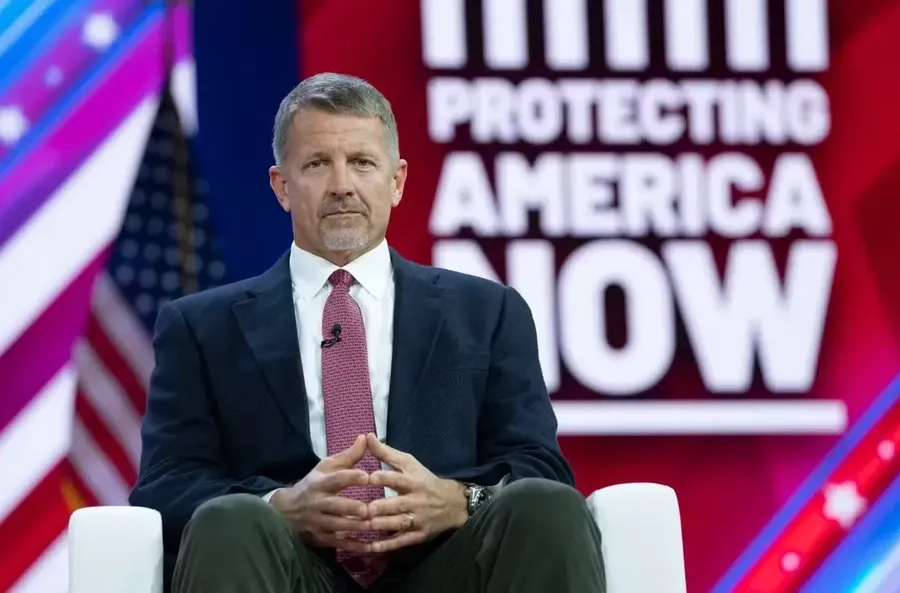
Erik Prince, founder of the private security company Blackwater, at the Conservative Political Action Conference (CPAC) in National Harbor, Maryland, on March 4, 2023. (ALEX BRANDON/AP)
Eventually, Prince would be contacted by George Nader, a national security advisor to the United Arab Emirates, to connect with oligarch Kirill Dmitriev. Kirill is the head of a Russian sovereign wealth fund who pushed for better US/Russia relations. Nader would consider Dmitriev to be Putin’s interlocutor, and would regularly communicate Dmitriev’s views directly to the Crown Prince of the UAE.
Dmitriev had inarguable ties to Putin and the inner workings of the Russian government, and on November 9th, 2016, after Hillary conceded the election, Dmitriev received a message saying “Putin has won”. The source for this claim, as well as who said it to him, have been redacted.
Later that same morning, Dmitriev would contact Nader to request a meeting with “key people” in the administration. He told Nader to tell the administration that they wanted to start rebuilding the relationship (between Russia and the US) at whatever is a comfortable pace for them, as they understood the sensitivities and weren’t in a rush. Dmitriev also told Nader he would ask for permission from Putin to travel to the US, to speak positively about Trump and his impact on Russia.
Dmitriev had previously tried to have Nader connect him with key officials, but there is no evidence Nader followed through on this until after the election.
After continual pestering from Dmitriev on setting up a meeting, particularly with Jared Kushner or Donald Jr., Nader would travel to New York and meet Erik Prince on January 3rd, 2017. They discussed Dmitriev, with Nader telling Prince that the Russians wanted to build a link with the incoming Trump admin. Nader would float the idea of Prince and Dmitriev meeting to discuss “issues of mutual concern”. Prince would eventually agree, but told Nader he needed first to check with Transition Team officials before any meeting.
After the meeting, Nader would text Dmitriev that he had just met with “key people within the family and inner circle”, and that they spoke positively about Dmitriev. Nader told Dmitriev to send his bio to pass along, and Dmitriev sent him a two page biography, and a list of positive quotes about Trump.
Nader would forward this to Prince the next day, and Prince would open them at Trump Tower within an hour of having received them. Prince would tell investigators that at Trump Tower, he spoke with Kellyanne Conway, Wilbur Ross, Steve Mnuchin, among others while waiting to meet with Bannon. Prince would claim that he cannot remember if during those three hours he spoke with Bannon or mentioned Dmitriev at all. Memory loss apparently being something of a contagious issue within the Trump campaign.
Prince would book a flight to the Seychelles, on January 7th, 2017, and the next day, Nader texted Dmitriev that he had a “pleasant surprise” for him. The surprise was a “special guest” from “the new team”, and Dmitriev agreed to go to the Seychelles to meet Prince on the 12th.
Dmitriev, for his part, was skeptical about Prince’s access to the Transition Team. Nader would soothe his worries by promising Prince was very well connected and trusted, but that he was designated by Steve Bannon to meet with him.
The meeting would go through, and Prince and Dmitriev met for the first time on January 11th, 2017, at Nader’s villa, with Nader there.
In the short 30 minute meeting, Prince would rant about the Obama administration, and that he was looking forward to a new era of cooperation and conflict resolution. He told Dmitriev that Bannon was effective, if not conventional, and that Prince regularly provided policy papers to Bannon. The topic of Russian interference did not come up. As the meeting ended, Prince told Dmitriev that he’d loop in Bannon. If there was continued interest, someone would call.
Prince went back to his hotel room, and learned that a Russian aircraft carrier was headed to Libya. He instantly called Nader and asked for another meeting. He said he checked with his associates in the States and that Libya was “off the table”.
The second meeting happened in a restaurant at the Four Seasons. There, Prince told Dmitriev that the US couldn’t accept any Russian involvement in Libya. Unfortunately the rest of the meeting was censored, so if anything else came up, it wasn’t shown in the report.
After the second meeting, Dmitriev was disappointed in the meetings for two reasons. First, he thought the Russians needed to be meeting with someone higher up in the food chain. Second, he wanted to have a conversation of greater substance, like outlining a strategic roadmap for both countries. It is unclear due to censoring, but Dmitriev thought some of Prince’s comments were insulting to some degree.
Prince, for his part, would text Bannon immediately after the meeting, but the investigation was unable to obtain these texts. On January 12th, a day after the Seychelles meetings, Prince would contact Bannon’s personal assistant to set up a meeting.
Prince would meet with Bannon at his home after coming back to the US, and they discussed several topics, including Dmitriev. Prince explained to Bannon that Dmitriev was the head of a Russian sovereign wealth fund, and Prince had a screenshot of Dmitriev’s wikipedia page dated around that time. Prince agreed he likely showed the screenshot to Bannon, and provided him with Dmitriev’s contact info. Prince would claim that Bannon instructed him to not follow up, and that Bannon seemed generally uninterested.
Bannon, for his part, said he never discussed anything regarding Dmitriev or any meetings with Russians or people associated with Putin. Bannon then said that if Prince had mentioned a meeting, Bannon would have remembered it, and objected to it.
Unfortunately, these stories couldn’t be accounted for at all, since Prince and Bannon mysteriously lost all messages they had made around the time of the Seychelles meeting. Bannon’s devices had no messages from that period, and he claimed not to know why. Prince’s phone had no texts at all prior to March 2017, even though records show he and Bannon exchanged dozens of messages. Prince similarly had no idea why there were no messages on his phone before March 2017.
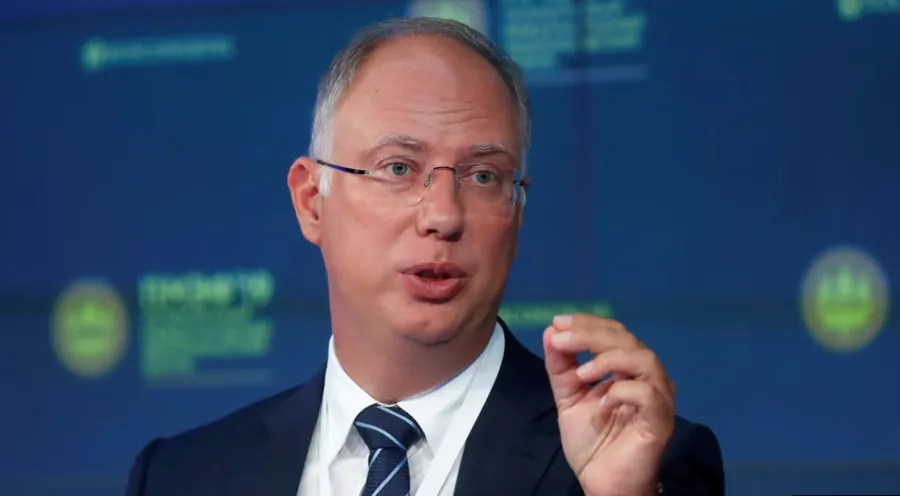
Russian Envoy Kirill Dmitriev (file photo)
However, Dmitriev did not rely solely on Prince for a meeting. Nader introduced Dmitriev to Rick Gerson, a friend of Kushner and hedge fund manager. Gerson didn’t have any role in the campaign other than casual talks with Kushner about it.
When they initially met, Dmitriev posed as a potential joint venture partner with his wealth fund and Gerson’s hedge fund, and that he wanted improved economic cooperation with US counterparts. Gerson said he could connect him with the right people in the incoming administration, but that they had to be confidential, considering the potential issues with meeting before any Senate confirmations on the new admin. Gerson said he would talk to Kushner and Michael Flynn, since they were the “key people” on the topics of Russia.
Dmitriev told Gerson that he was tasked by Putin to develop a reconciliation plan between the US and Russia, and they began exchanging ideas in December 2016. Gerson would claim to investigators that the Transition Team did not ask him to do this, and that he did it as a private citizen.
On January 16th, the five main points for the plan were consolidated. First would be jointly fighting terrorism, second, jointly engaging in anti–weapons of mass destruction efforts, three would be developing win-win economic initiatives, four maintaining an open and continual dialogue regarding disagreements, and five, ensuring proper communication between key people for either country.
Gerson would give a copy of this to Kushner, who had not heard of Dmitriev yet. Kushner said he would give it to the right people, ultimately giving a copy to Bannon and to Secretary of State Rex Tillerson. Neither would follow up, according to Kushner. The next day, Dmitriev gave the document to Nader.
On January 26th, Dmitriev emailed Gerson that his “boss” (a reference to Putin) was asking for feedback on the proposal, urging that they didn’t want to rush things, but wanted to try and have key meetings in the next two weeks. He told Gerson that Putin and Trump were going to call that Saturday, and that he knew the call was ‘very confidential.’
Dmitriev would then message Nader, saying his “boss” wanted to prioritize a communications channel “to avoid bureaucracy”. The next day, Dmitriev asked Nader for confirmation that some of the ideas from his proposal would be used by Putin. Nader assured him that they “took it seriously!”.
After the call between Trump and Putin ended, Dmitriev messaged Nader saying the call went very well. He would then message Gerson, telling him the document they drafted “played an important role”.
The two would stop communication around March 2017, when a joint investment deal they were working on began stalling.
Prince may have called it diplomacy, but let’s not pretend his beautiful Seychelles getaway with Dmitriev was anything more than a lovely little vacation where the cocktails were served cold and the treachery ran hot. While Prince played errand boy for Steve Bannon’s shadow foreign policy, Dmitriev and his messenger, George Nader, were busy threading the Kremlin’s influence through every open seam of the incoming administration. Nader was the courier, Dmitriev the money man, and Prince and Gerson the mules, smuggling Kremlin overtures straight into Trump’s orbit. Gerson’s “reconciliation plan” was no act of diplomacy, but another grab at the trough, driven by the same gluttonous greed that defined everyone in Trump’s circle. The hedge fund opportunist who couldn’t resist dipping his spoon into the caviar. Together, they were profiteers laying pipelines, channeling Russian influence straight into America’s veins, all in pursuit of money, access, and a coveted place at the boss’s table.
Dirt on Clinton
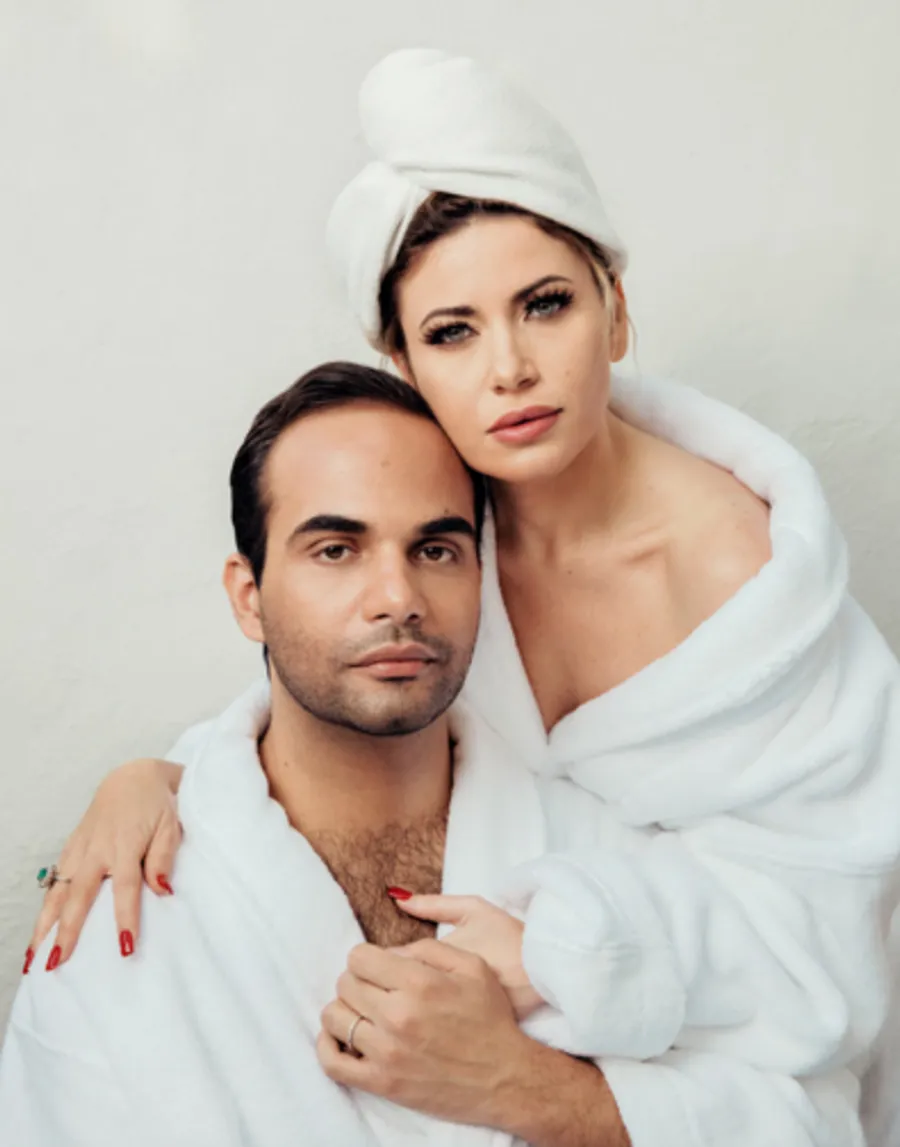
Papadopoulos and his wife (Photo by Elisabeth Caren)
George Papadopoulos was the foreign policy advisor to the campaign, entering the role on March 17th, 2016. About a week after becoming an advisor, Papadopoulos would travel to Rome, Italy, as part of his duties at the London Centre of International Law Practice (LCILP). The trip was to meet officials with Link Campus University, and during the visit, Papadopoulos would meet his partner in crime, Joseph Mifsud.
Joseph Mifsud was a professor from the London Academy of England. Mifsud had various Russian contacts, including a one-time employee of Russia’s Internet Research Agency (IRA). He discussed potentially meeting with these people in January 2017 in Russia, but there’s no evidence of this meeting going through.
Mifsud at first was uninterested and unimpressed with Papadopoulos, but as soon as he mentioned his role in the Trump Campaign, Mifsud became extremely friendly. They discussed Mifsud’s Russian and European contacts, generally discussing Russia. Mifsud offered to introduce Papadopoulos to people with contacts to the Russian government. This interested Papadopoulos, since having those connections himself would make him seem more important to the Trump Campaign.
On March 24th, 2016, Papadopoulos met with Mifsud in London, and Mifsud brought a friend. A Russian female named Olga Polonskaya, she was introduced as a former student of Mifsud who had connections to Putin. Olga told Papadopoulos that she could help him establish Russian contacts.
Following this meeting, Papadopoulos sent emails to Trump’s foreign policy team with the subject line “Meeting with Russian leadership – including Putin”.
I just finished a very productive lunch with a good friend of mine, Joseph Mifsud, the director of the London Academy of Diplomacy… The topic of the lunch was to arrange a meeting between us and the Russian leadership to discuss U.S.-Russia ties under President Trump ... They said the leadership, including Putin, is ready to meet with us and Mr. Trump should there be interest. Waiting for everyone’s thoughts on moving forward with this very important issue.”
After sending the extremely subtle email, Sam Clovis, co-chair of the Trump campaign, would email back.
“This is most infonnative … No commitments until we see how this plays out. My thought is that we probably should not go forward with any meetings with the Russians until we have had occasion to sit with our NATO allies, especially France, Germany and Great Britain … More thoughts later today. Great work.”
This led to a foreign policy team meeting, on March 31st, 2016, at the Trump International Hotel in Washington. There, everyone on the team made introductions, and Papadopoulos bragged about his energy sector work, and that he could facilitate a meeting with Russian officials, specifically Putin.
Campaign advisor J.D. Gordon was at the meeting, and told investigators he had a “crystal clear” recollection of the meeting. Finally, someone whose memory works. Gordon said Trump was receptive and interested in meeting with Putin, and that Sessions opposed the proposal. Papadopoulos would claim he remembered Sessions also being supportive.
Regardless of what Sessions said, Papadopoulos continued his efforts to arrange a meeting. He regularly emailed Mifsud and Polonskaya, attempting to find Russian contacts to meet with. Papadopoulos told Polonskaya that he wished to meet with anyone she recommended for a potential foreign policy trip to Russia.
Mifsud, who was in the email chain, replied that he would be flying to Moscow on the 18th for meetings at the Duma. Papadopoulos thanked him and said he’d see him tomorrow. Polonskaya would add “we are all very excited the possibility of a good relationship with Mr. Trump … the Russian Federation would love to welcome him once his candidature would be officially announced.”
Mifsud and Papadopoulos would meet at the Andaz Hotel in London, on April 12th, 2016, and following that meeting, Mifsud would travel to Moscow. There, he would introduce Papadopoulos over email to Ivan Timofeev, who Mifsud described as having connections with the Russian Ministry of Foreign Affairs.
Over the next few weeks, they had multiple conversations on Skype and email setting “the groundwork” for a potential meeting between the Campaign and Russia. Timofeev would end up telling Papadopoulos that he had spoken to “Igor Ivanov, President of RIAC and former Foreign Minister of Russia” to arrange a meeting.
After coming back from Russia, Mifsud and Papadopoulos would again meet at the Andaz, where Mifsud told Papadopoulos that the Russian government had secured “dirt” on Hillary Clinton in the form of thousands of emails.
On May 6th, Papadopoulos would tell the Greek Foreign Minister that the Trump Campaign had received indications from the Russian government that Russia could help Trump win the election by releasing damaging information on Clinton.
Papadopoulos and Campaign officials who interacted with him could not remember whether or not Papadopoulos shared the “dirt” on Clinton or that Russia could release them anonymously. (MR93) Papadopoulos was hit with the same memory bug as everyone else in Trump Tower, it seems, though he did remember an incident where Clovis got upset at him mention that “they have her emails”.
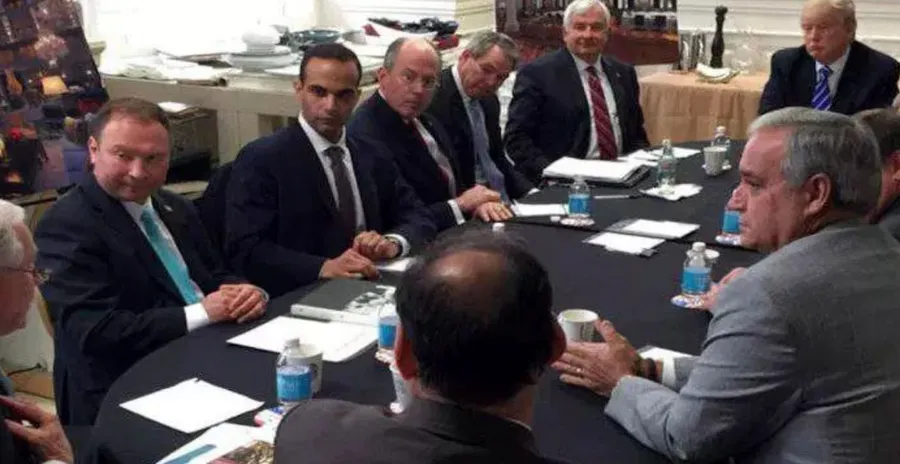
March 31, 2016 Meeting of Foreign Policy Team, with Papadopoulos (Fourth from Right of Candidate Trump)
Papadopoulos would desperately attempt to leverage these connections to facilitate the meeting. He emailed Stephen Miller and campaign manager Corey Lewandowski multiple times about a potential meeting. On May 4th, he sent Lewandowski an email from Timofeev, about a meeting in Moscow. He sent the same email to Paul Manafort on May 21st, and Manafort would forward it to another official, saying,
“Let’s discuss. We need someone to communicate that Trump is not doing these trips. It should be someone low level in the Campaign so as not to send any signal.”
Papadopoulos would continue sending emails to different people, replying to an old email chain where Lewandowski floated the idea of a visit. Lewandowski told Papadoupolos to connect with Clovis, and he emailed Clovis that the Russian MFA was asking if Trump was interested in visiting Russia at some point. On Lewandowski’s last day as campaign manager, he emailed him, saying he was “willing to make the trip off the record if it’s in the interest of Mr. Trump and the campaign to meet specific people.”
After Lewandowski left, Papadopoulos connected more with Sam Clovis, and attended a summit of the Transatlantic Parliamentary Group on Counterterrorism (TAG). Clovis did not remember attending the summit at all, but Papadopoulos remembered discussing Russia and a foreign policy trip with him at the event. This is backed up by handwritten notes made by Papadoupoulos at the time of the meeting.
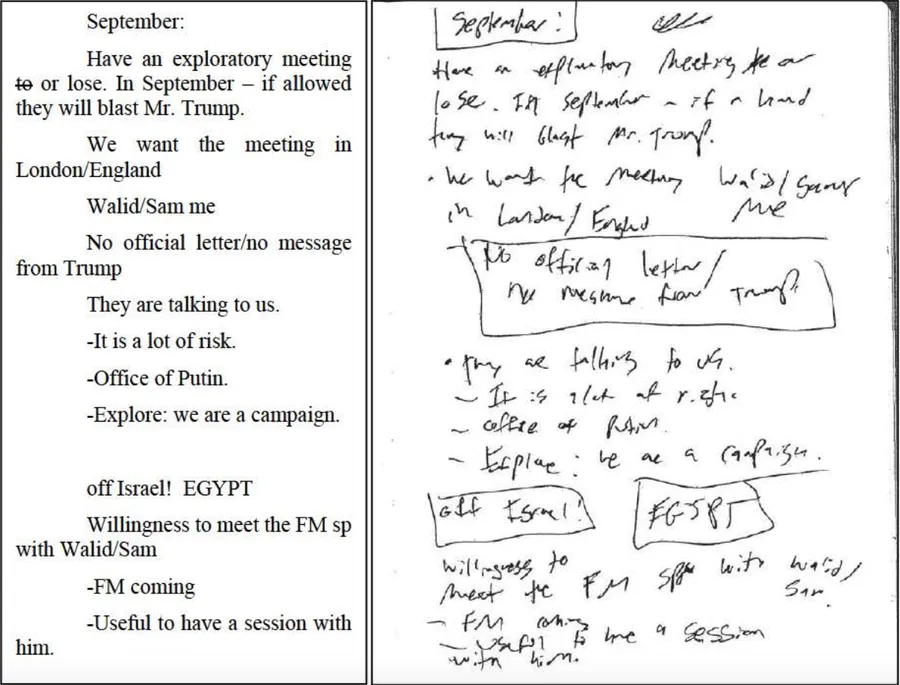
Clovis would eventually determine he could not travel, telling Papadopoulos that he “could not travel before the election” but would “encourage Papadopoulos to make the trips, if it is feasible.”
However, Papadopoulos’ time as a foreign policy advisor would abruptly end, when he gave an interview to Russian news agency Interfax, which generated too much backlash for the Trump campaign to keep him on.
George Papadopoulos was small, overeager, and desperate — the Trump campaign’s yapping chihuahua, desperate to prove he belonged in the big dogs’ yard. Every time he got a whiff of attention, he barked louder about his Russian connections, mistaking his own noise for influence. Joseph Mifsud saw him for exactly what he was: an ambitious lightweight who could be easily flattered and steered. Together, they played a dangerous game, dangling the promise of Kremlin contacts while Papadopoulos tripped over himself trying to deliver something of value to the campaign. He strutted around yipping about meetings with Putin and “dirt” on Hillary Clinton, only for everyone else in Trump’s orbit to suddenly develop amnesia about whether he’d ever mentioned it. In the end, his need to be taken seriously was his undoing. He barked one time too many in front of the wrong people, giving an interview to Interfax that embarrassed the campaign and got him tossed out like a dog who bit the hand that fed him. Where does such a loyal dog go after his master releases him? An editor at a pro-Russia newspaper, it seems.